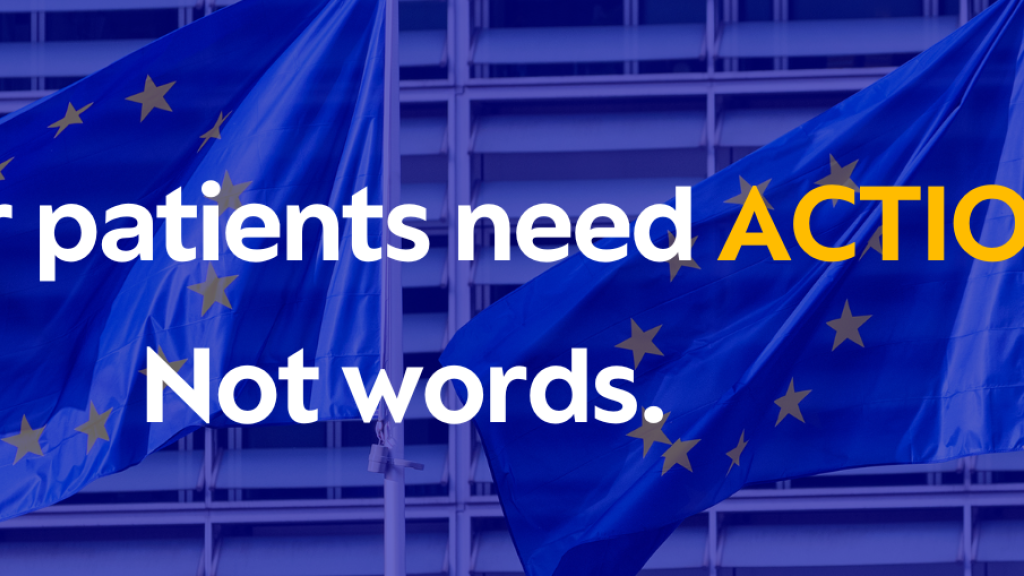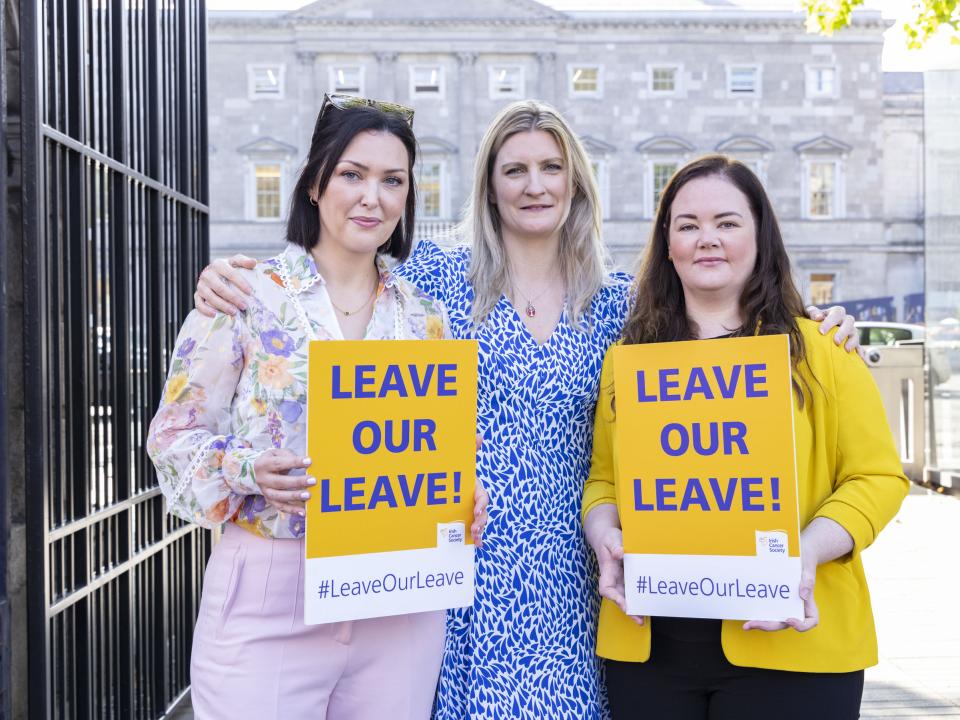
The Irish Cancer Society’s asks to 2024 European Election candidates are the following:
- Prioritise the need to protect younger people in Ireland from the cynical marketing of vaping companies, specifically by making the EU regulatory framework more responsive, as per legislative updates set out in the EU Beating Cancer Plan.
- Build coalitions, and better co-ordinate, with EU Member States on medicines pricing and procurement processes to help tackle inequity for patients in Ireland trying to access life-changing medicines.
- Urge the Irish Government to legislate for the ‘Right to be Forgotten beyond cancer’ to ensure cancer survivors in Ireland can enjoy the same protections as survivors in other EU Member States.
Vaping and e-cigarettes
There has been an alarming increase in the rates of young people in Ireland who now use e-cigarettes and vapes. According to a key 2023 Healthy Ireland survey,[i] 20% of females and 16% of males aged 15-24 now use e-cigarettes daily/occasionally - a jump of 11% on 2022.[ii]
Worryingly, the wide range of fruity and sweet flavours on offer to younger people is decreasing their perceptions of harm related to these products.[iii] Similarly, e-cigarette packaging often features cartoon characters with names such as “gummy bears” using bright colours, tactics which are clearly being used to target young people.
The World Health Organisation (WHO) reports on the highly addictive nature of nicotine found in most e-cigarettes and the long-lasting, damaging effects on brain development particularly as a young person’s brain continues to develop until the age of 25 years.[iv] Recent research from the Royal College of Surgeons in Ireland indicates that future cancers are likely to emerge due to long-term exposure to vapes.[v]
At an EU level, more must be done to protect younger generations from the cynical and relentless marketing of vaping companies. Taxation must be introduced for nicotine inhaling products along with restrictions on e-cigarette flavours, packaging, point of sale display, use in public areas and stronger social media content regulation.
The Tobacco Products Directive 2014[vi] sets out legislative requirements for EU Member States regarding the manufacturing, presentation and sale of tobacco and related products, including electronic cigarettes.
Timelines were established in the Beating Cancer Plan to review and evaluate the Tobacco Products Directive, the Tobacco Taxation Directive as well as relevant tobacco control files.
However, these timelines have been delayed which is having a knock-on effect on subsequent, necessary updates to EU level regulations to cover emerging market products.
The current EU regulatory framework is not responsive to novel products emerging onto the market, nor to the rise in popularity of nicotine inhaling products such as e-cigarettes or vapes.
Action: Prioritise at EU level the need to protect younger people in Ireland from the cynical marketing of vaping companies, specifically by making the EU regulatory framework more responsive, as per legislative updates set out in the EU Beating Cancer Plan.
Timely, equal access to medicines
In Ireland, there are serious delays associated with decisions in the reimbursement and pricing process, which is having a huge impact on cancer patients, many of whom could live longer and better lives were they able to access such medicines in a faster period of time.
Ireland already spends a significant sum on medicines. Overall, Ireland spends approximately 12.5% of its healthcare budget on medicines: €1 out of every €8.[vii]
However, the reality is that fewer than half (45%) of drugs undergoing the reimbursement and pricing decision-making process in Ireland are completed within a year; only 3 in 5 (62%) are completed within 2 years.[viii] Unfortunately, Irish patients are waiting too long to access medicines. Delays and slow progress mean that some cancer drugs become available to people with private health insurance but not public patients.[ix]
Previously, the EU has proven its ability to work on behalf of member states in securing life-saving pharmaceuticals. In response to the COVID-19 emergency, the EU launched a single point of contact monitoring system of medicines used to treat COVID-19.[x] These responses required clear coordination of rules, activities, and stakeholders.
It is imperative that such pooled procedures now exist to ensure timely availability of and access to medicines for people affected by cancer across the whole of the European Union.
There are a range of benefits associated with pooled public procurement of medicines between and across countries, for instance: reduced purchase price, operational costs and administrative burdens; improved transparency, data availability, commodity supply and quality assurance; attractiveness of joint markets; and, crucially, faster processes.[xi]
Across Europe there are many challenges to procuring medicines, for instance, pricing lacks transparency,[xii] and there is information asymmetry between pharmaceutical companies and purchasers. Pharmaceutical companies know the full cost of research and development (R&D), associated production, marketing/roll-out, but the purchaser does not. Overall, costs can be decided based on R&D costs, desired return on investment, production and marketing, and the perceived value of the medicine.[xiii]
By coalition-building on pricing and urging better co-ordination on public procurement processes at EU Member State level, this would bring benefits to people affected by cancer in Ireland, and across the EU.
For example, the BeNeLuxA (Belgium, Netherlands, Luxembourg, Austria and Ireland) initiative sets up a framework for collaboration across a range of areas: price negotiation, information sharing and engagement in health technology assessment cooperation.[xiv]
Action: Build coalitions - and better co-ordinate - with other EU Member States on medicines pricing and procurement processes to help tackle inequity for patients in Ireland trying to access life-changing medicines.
Urge for legislation for the ‘Right to be Forgotten’ beyond Cancer
Today, approximately 200,000 people in Ireland are living beyond a cancer diagnosis.[xv] Now, 3 in 5 people[xvi] and 4 in 5 children[xvii] diagnosed with cancer are alive 5 years after their diagnosis.
While this is great news, many Irish people diagnosed with cancer find themselves facing financial penalties years or even decades after the completion of their treatment. Report findings from February 2022 shows that people affected by cancer were more likely than the general population to feel they experienced difficulty when dealing with banks and insurance providers and when purchasing financial products (59% vs. 42%).[xviii]
The inability to access loans or insurance impacts people affected by cancer in practical ways, often hindering their dream to purchase their own home, to travel and get on with their life after cancer.
As of May 2024, 8 EU Member States have adopted national legislation recognising the ‘Right to be Forgotten beyond cancer’, including France who led the way in 2016.
While a Code of Practice has been in place in Ireland since July 2023, it is voluntary, limited in scope and only disregards a previous diagnosis after seven years post-treatment for those diagnosed over the age of 18.
The Irish Cancer Society calls on EU election candidates to use their platforms to urge the Irish Government to legislate now on the ‘Right to be Forgotten beyond cancer’ to ensure a previous cancer diagnosis is disregarded after 5 years for all those affected, with a reference table for specific cancer types.
Action: Urge the Irish Government to legislate for the ‘Right to be Forgotten beyond cancer’ to ensure cancer survivors in Ireland can enjoy the same financial protections as survivors other EU Member States.
Sources:
[i] Gov.ie. 2023. Available at: https://www.gov.ie/en/publication/73c9d-healthy-ireland-survey-2023/
[ii] Gov.ie. 2022. Available at: https://www.gov.ie/en/publication/f9e67-healthy-ireland-survey-2022/#smoking
[iii] SCHEER (Scientific Committee on Health, Environmental and Emerging Risks). 2021. “Scientific Opinion on electronic cigarettes”, 16 April 2021.
[iv] WHO. 2020. Available at: https://www.who.int/news/item/05-02-2020-e-cigarettes-are-harmful-to-health
[v] Kishimoto, A., Wu, D. & O’Shea, D.F. 2024. “Forecasting vaping health risks through neural network model prediction of flavour pyrolysis reactions”. Sci Rep 14, 9591. https://doi.org/10.1038/s41598-024-59619-x
[vi] European Commission. 2021. “Health Promotion and Disease Prevention Knowledge Gateway. https://knowledge4policy.ec.europa.eu/health-promotion-knowledge-gateway/tobacco-smoking/directive_en#directive201440eu
[vii] Minister for Health, Stephen Donnelly. 2024. In response to PQ 1817/24, asked by Deputy Bernard Durkin. Available at: www.oireachtas.ie/en/debates/question/2024-01-18/10/ [Accessed: 22 May 2024].
[viii] Mazars. 2020. “Review of the Governance Arrangements and the Resources currently in place to support the Health Service Executive reimbursement and pricing decision-making process.” Dublin: Mazars.
[ix] Hofmarcher, T., Ericson, O., Lindgren, P. 2022. “Comparator Report on Cancer in Ireland – Disease Burden, Costs and Access to Medicines.” Available at: www.ipha.ie/wp-content/uploads/2022/10/IHE-Cancer-Care-Comparator-Study.pdf [Accessed: 21 May 2024].
[x] https://www.consilium.europa.eu/en/policies/coronavirus-pandemic/covid-19-public-health/
[xi] Vogler, S., Salcher-Konrad, M. Habimana, K. 2022. “Study on Best Practices in the Public Procurement of Medicines. Final Report.” Brussels: European Commission.
[xii] WHO. 2018.
[xiii] WHO. 2018.
[xiv] Vogler, S., Salcher-Konrad, M. Habimana, K. 2022. “Study on Best Practices in the Public Procurement of Medicines. Final Report.” Brussels: European Commission.
[xv] National Cancer Registry Ireland (NCRI). 2021. “Cancer in Ireland 1994-2019: Annual Report of the National Cancer Registry. 2021 Annual Report.”
[xvi] ibid
[xvii] Barrett, P. M., Mullen, L., McCarthy, T. 2020. “Enduring psychological impact of childhood cancer on survivors and their families in Ireland: A national qualitative study.” European Journal of Cancer Care. Volume 29, Issue 5.
[xviii] https://www.cancer.ie/about-us/cancer-advocacy/access-to-financial-services-and-products-survey
For more information
Phone
01 231 0500




